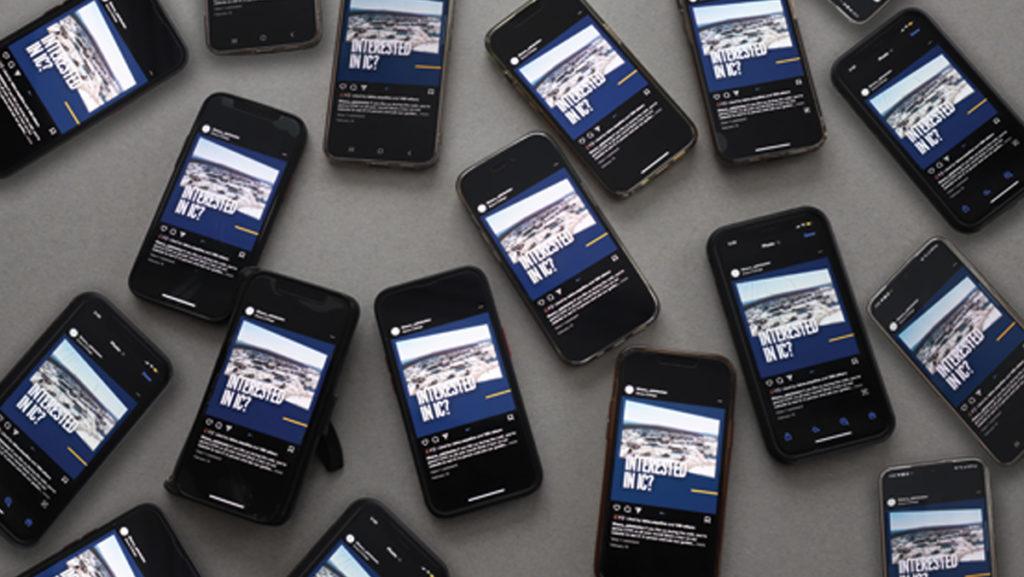With technology rapidly expanding and student enrollment in higher education declining, institutions like Ithaca College are investing more resources in social media and internet advertising.
Melissa Marchese, executive director of Marketing Strategy, said the college works with a professional third-party media buying firm that negotiates and secures the best possible market rate for ads. The college funds advertisements on many social media platforms like Facebook, Instagram, Youtube and TikTok, while also budgeting for sponsored listings on Google and other search engines. Additionally, the college uses retargeting campaigns that display ads on other web pages after someone has visited the college’s webpage.
Marchese said that while the social media posts do not directly cause students to go to the college’s website and apply or commit, they increase the college’s brand awareness.
“The intention of that [brand awareness] is to be where they are,” Marchese said. “All the supplemental things that we’re doing in both marketing communications and on the admissions side is to reach those students and to complement their journey.”
First-year student Grace Young said that while she did see the college’s marketing materials online, along with other institutions, this content did not greatly influence her enrollment decision.
“For me personally, I don’t think it was as important as it might have been for other people,” Young said. “I don’t think I saw a lot of stuff personally but after I did research, I definitely started to see more things.”
Young said she also saw more promotional material and content from other colleges on social media than she did from Ithaca College.
“I didn’t really pay much attention to them as well because they weren’t colleges I was looking into,” Young said. “But, I definitely saw other colleges do more with social media.”
Marchese said the college has been increasing brand awareness advertising for over five years.
“We’ve been doing different types of advertising,” Marchese said. “TikTok in the past year or so, but Facebook, YouTube and Instagram have been going on longer.”
Marchese said the college will look at data from different regions to see where it has the largest reach, like New York; this also helps it to decide where to target its advertising more.
“From there we try to have an ‘always on’ approach where we are doing something in the market all year long,” Marchese said.
Marchese said the time of year changes the different marketing approaches taken by the college. Different calls to action for prospective students include: learn more information, request more information, visit the college, come to an open house or confirm your enrollment.
Sophomore Lincoln Truesdale said the college’s promotion of the Roy H. Park School of Communications on social media helped him make a decision about enrolling at the college.
“I definitely remember when I started searching up the website, I saw more targeted ads on my feed and I think that’s kind of around the time that I made a decision,” Truesdale said. “I mean, I feel like they like to market the Park School a lot. And that’s what I saw, definitely, the most of. And just hearing about some of the alumni definitely helped as well.”
Truesdale said that while he felt uncomfortable the first time he found out about targeted advertisements, he has come to terms with the practice.
“I mean, I remember when I first found out about targeted ads, and … it bothered me a little bit,” Truesdale said. “But I feel like I’ve just become so used to so many different organizations doing that, that I’ve kind of just forgotten about how I used to feel and I’ve just kind of accepted it at this point.”
Nicole Eversley Bradwell, executive director of the Office of Admission, said digital and social media are tools that the Office of Admission uses within its comprehensive strategy to engage with its students and adapt to the changing technology.
“The last five years are much more robust,” Eversley Bradwell said. “And the tools available to not just our organization, but the planet are much more robust.”
Data from the Office of Analytics and Institutional Research shows that in 2022, the college received 12,446 applications, while 9,359 were admitted and 1,309 students enrolled. Applications peaked in 2014, with 18,207 applicants of which 10,763 were admitted and 1,560 students enrolled.
According to How To Geek, the two leading ad providers are Google and Facebook. Google collects information on users in multiple ways, like Google searches, videos watched on Youtube and places visited through Google Maps. Meanwhile, Facebook gains information through information included on both Instagram and Facebook profiles, and the actions taken on the accounts like users’ searches and likes.
These companies group users based on interests and demographics, making it easier for advertisers to reach their selected audience.
Eversley Bradwell said the college has had paid partnerships with college search tools that also partner with secondary schools, like Naviance, for a long time. According to Naviance, over 10 million students utilize its platform. Colleges are able to pay to advertise to specific groups of students based on factors like potential majors, race and geographic location.
Marchese said the college also does lots of organic advertising like encouraging accepted students to use the #icmyfuture, which allows the college to interact with the students and students to interact with each other by seeing their personal posts through the hashtag.
“Some of it’s also just about participation and having fun,” Marchese said.
Assistant News Editors Prakriti Panwar and Noa Ran-Ressler contributed reporting.








